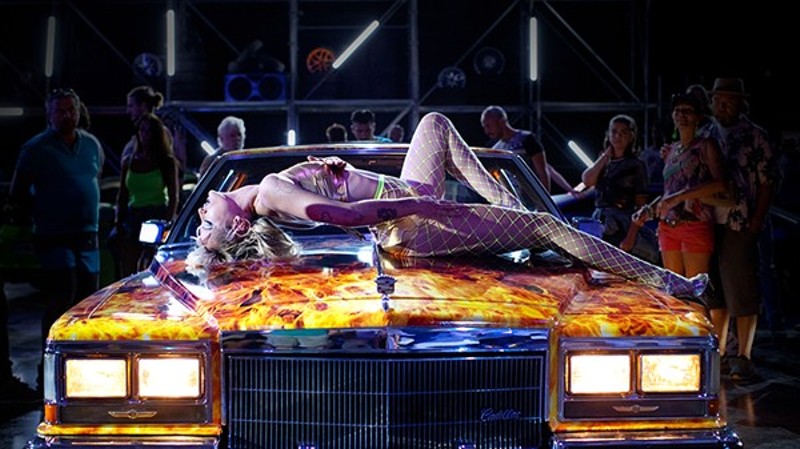Titane Takes Body Horror Into Glorious, Gender-Bending Overdrive
[
{
"name": "GPT - Leaderboard - Inline - Content",
"component": "41932919",
"insertPoint": "5th",
"startingPoint": "3",
"requiredCountToDisplay": "3",
"maxInsertions": 100
}
]
If you’ve ever wanted to fuck a firetruck, Titane is the movie for you.
It’s the movie for you if you’ve ever savored the stench of pumping gas, the stir of shifting gears, or the tremulous purr of a V8 engine. It’s the movie for you if you’ve ever found machines as erotic as they are efficient, as inspiring as they are destructive to our earthbound habitats. If you’ve ever wondered why men — and women — prefer a stick shift to a slush box. If you’ve found the term “torque” a turn-on, or “muscle car” conceptually (if not literally) compelling. If you’ve ever been appalled or confounded by the power of desire — or what even counts as desire and not crude, libidinous urge.
In an early scene, to the beat of “Doing It to Death” by the Kills, the camera voyeuristically roves through a motor show for over three hypnotic minutes, twisting under, over and around car hoods, fenders and the women’s bodies writhing up against them. “Get off me, asshole!” says a petite brunette in black leather accosted from behind. “Hands off, sir,” says the bouncer escorting him away. “Touch with your eyes.”
The second feature from body-horror virtuoso Julia Ducournau, Titane implores us to do the same — to be thrilled and repulsed in equal measure. At times one might easily forget that the movie is French art-house fare because its excessive violence and automotive conceit feel so utterly American. But with its hyper-stylized visuals and visceral investment in gender trouble, Ducournau presents a critique of masculinity that feels very un-American — ultimately seeking to shock more than moralize.
Named for the titanium plate fitted to its protagonist’s skull after a childhood car accident, Titane follows a 30-something woman named Alexia (Agathe Rousselle), whose sexual attraction to cars is as all-consuming as her appetite for killing. When the body count at last draws attention from police, Alexia adopts the persona of Adrien, a missing teenage boy whose face she sees displayed in the Marseilles-Provence airport. What ensues is a gender-bending, genre-shredding mélange of horror, thriller and domestic drama (think Drive, Boys Don’t Cry and a dash of the Danish film Shelley). But for all of Titane’s resemblances to both American and European influences (a particular killing spree, set to a bouncy Caterina Caselli tune, feels very Tarantino), the film as a whole is defiantly Ducournau, and feminist, at heart.
If Raw, Ducournau’s 2016 debut exploring cannibalism and female appetites, prompted fainting in the theaters, Titane leads less to nausea than a state of electrified squeamishness — most heightened in scenes of Alexia’s body in frenzied states of female abjection and self-mutilation. As Adrien, Rouselle’s lanky frame is convincing beneath an oversized hoodie, but her efforts to maintain such androgyny take on masochistic proportions. We are asked to consider Alexia’s predatory nature toward others alongside her brutality toward her own body, to reconcile her violence as a woman with her inherent vulnerability as a person presenting, for half of the film, as a terrified trans man.
At the same time Alexia’s female body is under both spectacular and invisible assault, the male body is exposed as equally prone to self-destruct. Adrien’s father Vincent (Vincent London) is a lonely fire captain doggedly attempting to preserve his physique, bruising his own backside with testosterone injections. “Are you sick?” Adrien asks, his first words spoken aloud after disrupting his father’s nightly bathroom ritual. “No,” Vincent responds, “just old.” As a figure of paternalism, Vincent is both a metonym for masculine power and a reminder of its fragile existence. Do we root for Alexia to kill him off too, or admire their growing bond with each other? Who is more at risk — father or son?
Rather than rely on tired rape revenge tropes (Promising Young Woman, anyone?), Ducournau probes the darker compulsions at the crosshairs of heterosexuality and white supremacy.
Toward the film’s climax, a simulated forest fire surrounds Vincent’s haggard body, reminding the viewer of the Bukowski quote tattooed between Alexia’s breasts: “Love is a dog from hell.” Like the painted flames that adorn the Cadillac hood she fellates in the film’s first act, desire is always dangerous, and what counts as compassion nearly always combustible.
If Titane came with trigger warnings, they would scroll for longer than the end credits. Those uncomfortable with bodily fluids, maiming or motor oil will not last long in the theater — nor anyone expecting a mindless joyride through adrenaline-charged violence. But for those of us who like to think while we squirm, to reconsider what makes us suddenly recoil, Ducournau’s latest is a galvanizing trip.







